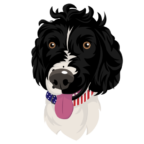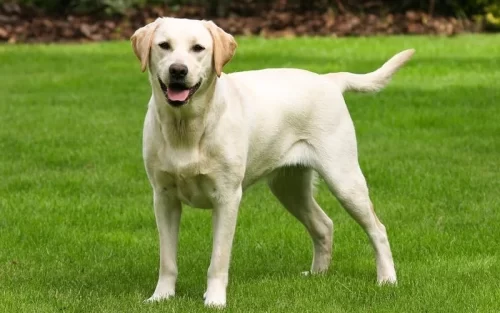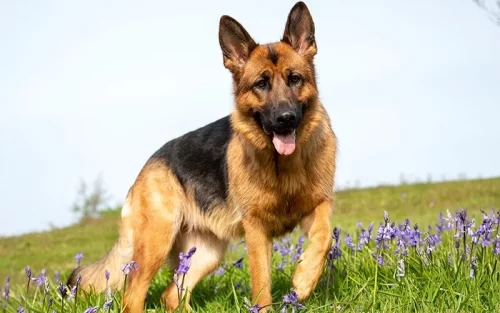Welcome to the fascinating world of Miniature Pinschers, a breed that captivates hearts with its playful charm and spirited nature. Often mistaken for tiny Dobermans, these diminutive dogs possess a unique character and boundless energy, defying their small stature. In this article, we’ll delve into the captivating qualities of Miniature Pinschers. We’ll explore their physical characteristics, temperament, and ideal living conditions.
Get ready to uncover the vibrant essence of these pint-sized powerhouses. Find out what makes them the perfect companion for those who appreciate their lively spirit and unwavering loyalty. Let’s embark on an exciting journey to unravel the charm of these tiny, spirited companions!
Physical Characteristics of Miniature Pinschers
The Miniature Pinscher, affectionately known as the “Min Pin,” is a small, muscular dog with a distinctively elegant appearance. Standing between 10-12.5 inches tall and weighing between 8-10 pounds, these compact canines pack a big personality into a tiny frame. Their short, sleek coat comes in various colors, including black and rust, chocolate and rust, and red, showcasing their vibrant and striking looks.
One of the breed’s most distinctive features is their high-stepping “hackney” gait, reminiscent of a prancing horse. Their dark, oval-shaped eyes radiate an expressive, self-assured gaze. And their erect, high-set ears contribute to their alert and spirited demeanor. With a strong, slightly arched neck and a docked tail carried erect, the Miniature Pinscher’s confident stance and graceful movements showcase the breed’s unmistakable charm and agility.
Personality Traits and Temperament
Miniature Pinschers are known for their vivacious, spirited personalities that captivate their owners and everyone they meet. These tiny dynamos are full of energy, and their curiosity and playfulness can make them a joy to be around. Despite their small size, Min Pins possess a bold, self-assured temperament, often taking charge of their surroundings with fearless determination.
Intelligent and independent, Miniature Pinschers can be stubborn at times, which may present challenges during training. However, with consistency and positive reinforcement, they are quick learners, eager to show off their newly acquired skills. Affectionate and loyal, Min Pins thrive on human interaction and form strong bonds with their families.
Socialization is essential to ensure a well-rounded and well-behaved Min Pin, helping them to adapt to different people, animals, and environments. With proper socialization and training, Miniature Pinschers can become delightful companions, always ready to share their zest for life with their loved ones.
Health and Lifespan of Miniature Pinschers
Miniature Pinschers are generally a healthy and robust breed, with an average lifespan of 12-16 years. However, like all dogs, they can be susceptible to certain health issues. As a responsible owner, being aware of these concerns can help you take the necessary preventive measures and seek early treatment if needed.
Some common health issues in Miniature Pinschers include:
- Patellar luxation
- Legg-Calvé-Perthes disease
- Progressive retinal atrophy (PRA).
Patellar luxation, a knee joint issue, can cause discomfort and may require surgical intervention in severe cases. Legg-Calvé-Perthes disease affects the hip joint and can lead to arthritis. Regular veterinary check-ups and monitoring your dog’s activity can help identify and address these conditions early on.
To ensure your Miniature Pinscher’s long-term health, maintain a consistent schedule of vaccinations, parasite control, dental care, and regular vet visits. Providing a balanced diet and ample exercise can also contribute to their overall well-being, promoting a happy and healthy life for your spirited companion.
Exercise and Activity Level
Though small in size, Miniature Pinschers possess a lively spirit and require regular exercise and mental stimulation to keep them happy and healthy. These energetic dogs benefit from daily walks, interactive play, and engaging activities that challenge their minds and bodies.
A brisk 30-minute walk or two shorter walks per day, combined with play sessions or puzzle toys, can help satisfy your Min Pin’s exercise needs. Due to their inquisitive nature and speed, it’s crucial to keep your Min Pin on a leash or in a securely fenced area during outdoor activities, as they may be prone to chasing or wandering off.
Miniature Pinschers can adapt well to various living situations, including apartments, provided they receive adequate exercise and mental stimulation. By dedicating time each day to engage your Min Pin in fun, interactive activities, you’ll support their physical and mental well-being while strengthening the bond you share with your energetic companion.
Grooming and Maintenance of Miniature Pinschers
Grooming and maintenance for Miniature Pinschers is relatively easy, thanks to their short, smooth coats. Regular brushing with a soft-bristle brush or grooming mitt once or twice a week helps to remove loose hair and distribute natural oils, keeping their coat healthy and shiny. Min Pins are moderate shedders, and a consistent grooming routine can help minimize hair around your home.
Beyond coat care, it’s important to maintain your Min Pin’s overall hygiene. Regularly check and clean their ears to prevent infection, and trim their nails every few weeks to keep them at a comfortable length. Dental care is also essential – brush your dog’s teeth several times a week to promote good oral health and prevent dental issues.
By incorporating grooming and hygiene into your routine, you’ll not only keep your Miniature Pinscher looking and feeling their best but also have the opportunity to monitor their health and catch any potential concerns early on.
Training and Socialization
Training and socialization play a critical role in shaping a well-behaved and well-adjusted Miniature Pinscher. Starting early is key, as their independent and sometimes stubborn nature can make training a bit challenging. Using positive reinforcement techniques, such as praise, treats, or toys, can make the process more enjoyable and effective for both you and your Min Pin.
Socialization is equally important, exposing your Miniature Pinscher to a variety of people, animals, and environments from a young age. This helps them develop confidence and adaptability, reducing the chances of fear or aggression in new situations. Puppy socialization classes, dog parks, and neighborhood walks are excellent opportunities to introduce your Min Pin to new experiences and interactions.
Consistency, patience, and a commitment to training and socialization are essential for a well-rounded Miniature Pinscher. With proper guidance and support, your spirited companion will grow into a confident, well-mannered, and loving member of your family.
Ideal Living Conditions for Miniature Pinschers
Miniature Pinschers are adaptable dogs that can thrive in various living conditions, provided their exercise and mental stimulation needs are met. Their small size makes them suitable for apartment living, but they also enjoy having access to a securely fenced yard where they can safely explore and play.
As energetic and curious dogs, Min Pins need a safe, structured environment to prevent them from getting into mischief. Ensure your home is free of hazards, and provide them with appropriate toys and chews to prevent boredom and destructive behavior.
These intelligent dogs can be sensitive to extreme temperatures, so make sure they have a comfortable indoor living space to protect them from harsh weather conditions. Miniature Pinschers are also known to be excellent escape artists, so it’s crucial to ensure your home and yard are secure to prevent them from wandering off.
When it comes to family dynamics, Min Pins can get along well with children and other pets if properly socialized. However, due to their small size, they may be better suited for families with older, more considerate children who understand how to interact with them gently and respectfully. With the right environment, support, and care, your Miniature Pinscher will flourish and become a cherished member of your family.
Diet and Nutrition
A balanced and nutritious diet is crucial for your Miniature Pinscher’s overall health and well-being. When choosing a food, look for high-quality options specifically formulated for small breeds, which cater to their unique nutritional needs and caloric requirements. Always consult your veterinarian for personalized recommendations based on your dog’s age, weight, activity level, and health status.
Portion control is essential for Min Pins, as they can be prone to obesity if overfed. Divide their daily food allowance into two or three smaller meals to help maintain a healthy weight and prevent issues related to overeating. Be cautious with treats, as they can quickly add unnecessary calories – use them sparingly and opt for healthy alternatives like small pieces of lean meat or vegetables.
Ensure your Miniature Pinscher has access to fresh water at all times, and monitor their intake to ensure they stay well-hydrated. Regular veterinary check-ups can help you stay informed about your dog’s nutritional needs and make any necessary adjustments to their diet. By providing your Min Pin with a well-balanced, appropriately portioned diet, you’re setting the foundation for a healthy, happy life together.
Who Should Consider a Miniature Pinscher?
Miniature Pinschers make excellent companions for those who appreciate their lively spirit, intelligence, and small size. They are well-suited for individuals or families who can dedicate time to regular exercise, mental stimulation, and training to channel their energetic and inquisitive nature positively.
If you enjoy an active lifestyle and are looking for a spirited, loving companion to share in your adventures, a Min Pin may be the perfect match. They are best suited for homes with older children who understand how to interact with them gently, given their small stature.
Potential owners should be prepared to invest time and patience into training and socialization, as Min Pins can be independent and occasionally stubborn. If you’re willing to embrace their unique temperament and commit to meeting their needs, you’ll be rewarded with an affectionate, loyal, and entertaining furry friend.
Those who have limited time for exercise, training, or are seeking a more laid-back breed may want to consider other options. However, for those who find joy in their vivacious personalities and are willing to invest in their care, Miniature Pinschers can make wonderful lifelong companions.
Finding a Miniature Pinscher Breeder or Rescue
When searching for a Miniature Pinscher, it’s crucial to find a reputable breeder or rescue organization to ensure you’re bringing home a healthy, well-adjusted companion. Responsible breeders prioritize the health, temperament, and welfare of their dogs and will provide you with valuable information about the breed, as well as the puppy’s lineage and medical history.
When visiting a breeder, observe the living conditions, and ask to meet the puppy’s parents. This can give you insight into their temperament and physical traits. A reputable breeder will also provide health clearances for common breed-specific issues and encourage open communication to support you throughout your dog’s life.
Alternatively, consider adopting a Miniature Pinscher from a rescue organization or shelter. Many Min Pins are in need of loving homes, and rescuing one can be a rewarding experience. Rescues typically assess the dog’s health and temperament, providing necessary medical care and helping to match you with a compatible companion.
Whether you choose to work with a breeder or rescue, take your time to find a trusted source. By doing thorough research and asking the right questions, you’ll increase your chances of welcoming a healthy, well-adjusted Miniature Pinscher into your family.
Min Pin Clubs and Groups
One of the most prominent is the Miniature Pinscher Club of America (MPCA). The MPCA is a national organization dedicated to the well-being and betterment of the breed. They work to promote responsible breeding, provide breed-specific information, organize events, and support Miniature Pinscher fanciers and owners.
Additionally, the American Kennel Club (AKC) recognizes the Miniature Pinscher breed, and local AKC-affiliated breed clubs may also have resources and events related to Min Pins. These clubs can be a valuable source of information, support, and networking opportunities for Miniature Pinscher enthusiasts.
To find clubs, organizations, or local events relating to Miniature Pinschers, you can visit the MPCA website or search for AKC-affiliated breed clubs in your area.
Conclusion
Miniature Pinschers are spirited, intelligent, and loving companions that can bring endless joy and entertainment to those who welcome them into their lives. With proper care, training, and attention, these tiny dynamos can become cherished family members, sharing their zest for life with their favorite humans. Embrace their unique personalities, and you’ll have a loyal, affectionate friend for life.



